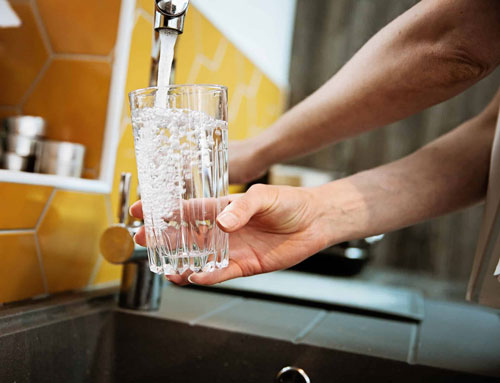Chloride is an ion produced from the element, chlorine. Chloride exists naturally in groundwater, streams, seawater, rainwater, and urban runoff. Even our blood contains Chloride and Sodium chloride is what you’ll find in table salt! While Chloride itself isn’t a major hazard, high amounts can be associated with Chloride intrusion. And it’s important to prevent too much Chloride from entering your water supply, as this can trigger a multitude of negative consequences.
What is Chloride Intrusion?
Chloride intrusion occurs when saltwater finds its way into freshwater aquifers. This result is due to the over-pumping of coastal aquifers, which disturbs the balance between freshwater and seawater. Typically, water travels by moving from high to low. When aquifer levels decrease, saltwater seeps in. When too much pumping of groundwater occurs, this decline becomes too immense and upsets the relationship between different water sources. In a natural environment, freshwater is organically directed away from saltwater due to the movements of the ocean. However, excessive pumping gets in the way of this natural process. Ultimately, this can make water unsuitable for drinking and other agricultural purposes.
How we experience High Chlorides in our region is salt run-off from our streets. The seasonal salting and brining of our roads and highways is very detrimental to our well water. When salt liquifies and runs off the roads into surrounding grass areas, it then leaches into our groundwater, adversely affecting our wells.

The Effects of Chloride Intrusion
You may be wondering exactly how a complicated issue such as chloride intrusion can affect your individual water supply. Here are just a few ways it can impact you:
- Corrosion. High levels of Chloride can be especially tough on metallic piping and other water fixtures. This can cause staining, oxidization and perforation of pipes. Corrosion by-products such as Copper and Lead could also leak into your supply. This could cause a considerable amount of damage, so it’s best to avoid corrosion at all costs.
- Prevents growth of vegetation. If you have a garden or rely on agricultural processes for your business, increased Chloride levels can impede plant growth.
- Increased salinity in water. When there is too much salinity in your water, you’ll know. Your drinking water should taste fresh and crisp, not salty like seawater! If anyone in your home is sensitive to high amounts of Chloride, this can also cause health problems such as Hypochloremia.
- Damage to home appliances. Water-reliant appliances in your home such as dishwashers and washing machines need high-quality water to run properly. If your water is contaminated with a high amount of Chloride, it can cause harm to your appliances. This might mean more repairs, added maintenance costs, and more frequent replacements.
How to Resolve Chloride Intrusion
The causes of Chloride intrusion are complex, and its effects are far-reaching. While we may not be able to personally resolve the problem of Chloride intrusion, we can do our best to mitigate this issue at home. This means treating your water regularly, choosing the correct solutions and maintaining your treatment systems. Here are a few steps you can take to resolve this issue and improve your water supply:
- Get a water test. If you are concerned about high levels of Chloride in your water, the best thing you can do is get a water test done. At Atlantic Blue Water Services, we offer FREE water testing for Basic contaminants and offer additional testing, per your concerns. You can choose to either schedule a home visit, or bring us a sample directly.
Once your water analysis is complete, we will provide you with a broad range of solutions.
- Utilize reverse osmosis systems. One of the best ways to mitigate excessive amount of chloride is by installing a reverse osmosis system. Reverse osmosis systems filter dissolved solids and break down substances like chloride, chromium, copper, lead, iron, mercury and magnesium. At Atlantic Blue Water Services, our fill stations utilize a 7-step filtration process that includes reverse osmosis. In addition, we can help you choose the right water treatment system for your home.
You and your family deserve high-quality water you can trust for cooking, cleaning and bathing. If you have any concerns about your water supply or have any further questions, don’t hesitate to contact us. Any potential issues with your water should be addressed sooner rather than later, and our specialists would love to help you!
Learn More about Solutions to Chloride Intrusion with Atlantic Blue Water Services
We provide water treatment and water softening solutions for homeowners that want a cleaner water supply and water that is free from hazardous carcinogens that can contribute to increased cancer risk. We’re also focused on providing additional education on water treatment, water quality, and issues associated with water contaminants. Call us at (410) 840-2583 to schedule your in-home water testing appointment today.
